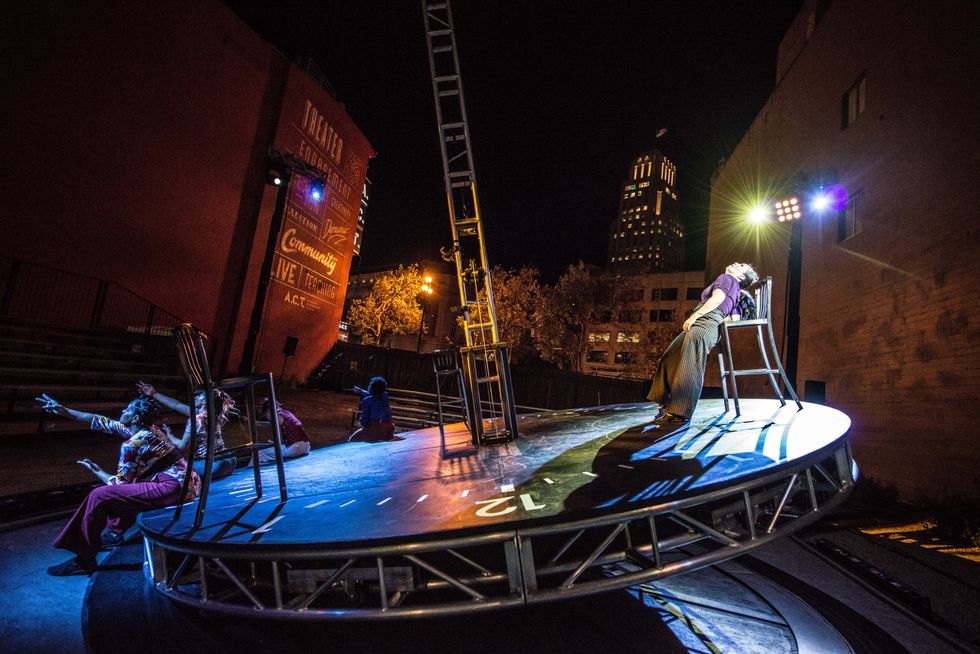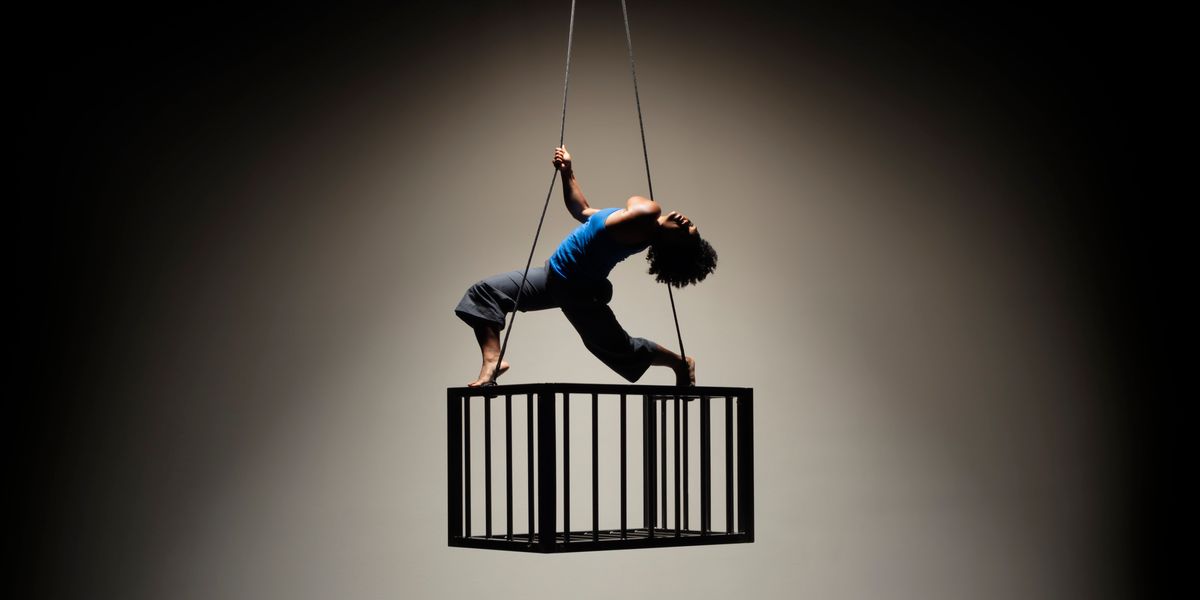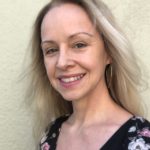Through Site-Specific Spectacle, Aerial Artist Jo Kreiter Is Exposing the Human Toll of the Prison System
There is a tragic timeliness to Flyaway Productions‘ Meet Us Quickly With Your Mercy. As the nation grapples with systemic racism and police brutality, as well as the COVID-19 pandemic, choreographer Jo Kreiter’s new aerial work seeks to amplify the call for ending the mass incarceration that disproportionately affects people of color. Meet Us is the second installation in The Decarceration Trilogy: Dismantling the Prison Industrial Complex One Dance at a Time, which uses public art to expose the human toll of incarceration—both the societal effects of normalizing it, and the emotional devastation felt by incarcerated individuals and their families.
To create Meet Us, which will be performed on the facades of co-presenter CounterPulse and the Dahlia Hotel in San Francisco’s Tenderloin district, Kreiter collaborated with Rahsaan Thomas, an accomplished writer and co-host of Radiotopia’s Pulitzer Prize–finalist podcast Ear Hustle who is incarcerated at San Quentin State Prison for second-degree murder. Their shared humanity, and by extension the humanity shared by all people on both sides of prison walls, is at the heart of Meet Us.
Kreiter recently spoke with Dance Magazine about the work, originally scheduled to premiere this month, though postponed to 2021 due to COVID-19.
What is the inspiration for
Meet Us?
Where the first piece in the trilogy, The Wait Room, was focused on my own experience as a woman with incarcerated loved ones, for Meet Us I’m expanding the question of who can and should have input into ending mass incarceration. How can Black and Jewish voices work together to amplify the call for racial justice? As a Jew, I start in my own body and experience. I put out a call for a Black changemaker who was interested in this question, and arrived at a collaboration with Rahsaan Thomas, who is the co-founder of the artist-activist nonprofit Prison Renaissance and who works from a cell at San Quentin.
As Americans take a hard look at racism and the police,
Meet Us feels profoundly relevant.
I’m really excited to be doing a project that is dead square in the middle of this deep need for a systems change. That’s one of the reasons I really pushed to do it this fall.

Bianca Cabrera right with ensemble in The Wait Room.
Austin Forbord Rapt Productions, Courtesy Flyaway Productions
You’re specifically looking at Jewish and Black communities, but what is the broader resonance of this work?
When I originally started developing the concept with Rahsaan, he cautioned me and said, “This can’t just be about Jewish voices, because there’s a fragment of white-saviorism in the way you’re speaking. It has to be about Black and Jewish voices working on the same page.” I loved that correction, how he helped me change course. And he’s right. It created an equality of investment in the concept from Rahsaan and me—and that is the work.
What are you both bringing to the collaboration?
Rahsaan wrote two articles related to this project. “Why I Run in Prison,” for Outside magazine, is about engaging in a physical practice to practice freedom. To me, that translates really well to aerial work, so it became a foundational way of thinking about the piece. Directly for the project, he wrote an essay called “Pushed and Shoved” that looks at how white supremacy is far more of a threat to both Black and other oppressed people than we might be to each other. Rahsaan said, “I want to invite this project to think about white supremacy as the target that has to get eroded, rather than cutting down on each other.” “Pushed and Shoved” is the frame that inspired the set design and the choreography.
The logistics of collaborating with somebody living in San Quentin must be challenging.
Most of our communication is through letters. It was also through phone calls until COVID happened, and now the phone calls are really restricted.
Did you have to adapt the choreography around COVID-19?
One of the beauties of this project is that the dancers are all really spread out. I had to eliminate one duet that required touch. I reworked it into something that is a duet, but physical space isn’t shared.
Why did you decide to perform this piece in the Tenderloin district, which is rich in indie arts but faces so many challenges with drugs and homelessness?
This district holds the most extreme contrasts of wealth inequality in the city. That’s a place to help create solutions. One accidental blessing is that CounterPulse is across the street from the Dahlia Hotel, which is used by people transitioning out of the prison system and back into their own lives.
The nexus of art and social justice is so powerful. Why?
Art gives us the possibility of changing the frame as we tell stories. It’s hard to change the frame when you’re reading policy. But art can be seed-planting. It changes people and how they think. That’s not a very profound statement, but it’s true.
Why is aerial dance effective in expressing these ideas?
Partly it’s spectacle, but there’s also a deep message.
Well, I think spectacle is communicative. Aerial work is inevitably a spectacular form. It is risk-based, it requires that you be at the top of your game physically, as a dancer, and that can be really fun to watch. I love working off the ground; I love the visual possibilities. You’ve got something that’s happening at 15 feet, 25 feet and 40 feet, so the action is stacked vertically, and you’re watching a few things at once, whereas on a regular stage you’re looking at things horizontally.
Is there anything you’ve learned through creating this work that gives you hope?
I feel a lot of hope around the possibilities that white allies have to really effect change, which means dismantling white supremacy and dismantling the prison systems and policing systems as the norm. I feel hopeful about the space that white people are taking to simultaneously step back and listen, and step up and act.
From Kreiter’s Collaborator: Rahsaan Thomas’ Reflection on Mercy
The title
Meet Us Quickly With Your Mercy is drawn from Psalm 79:8: “Don’t hold the iniquities of our forefathers against us. Let your tender mercies speedily meet us, for we are in desperate need.”
Early in their collaboration, Thomas shared this reflection with Kreiter: “Mass incarceration is rooted in white supremacy,” he wrote. “Most of us [in prison] are guilty of our crimes and want mercy from the sentence. Even though factors much bigger than choice landed us in prison, there is no excuse for harming others. So, we need Mercy, which should be granted, due to the totality of circumstances.”







